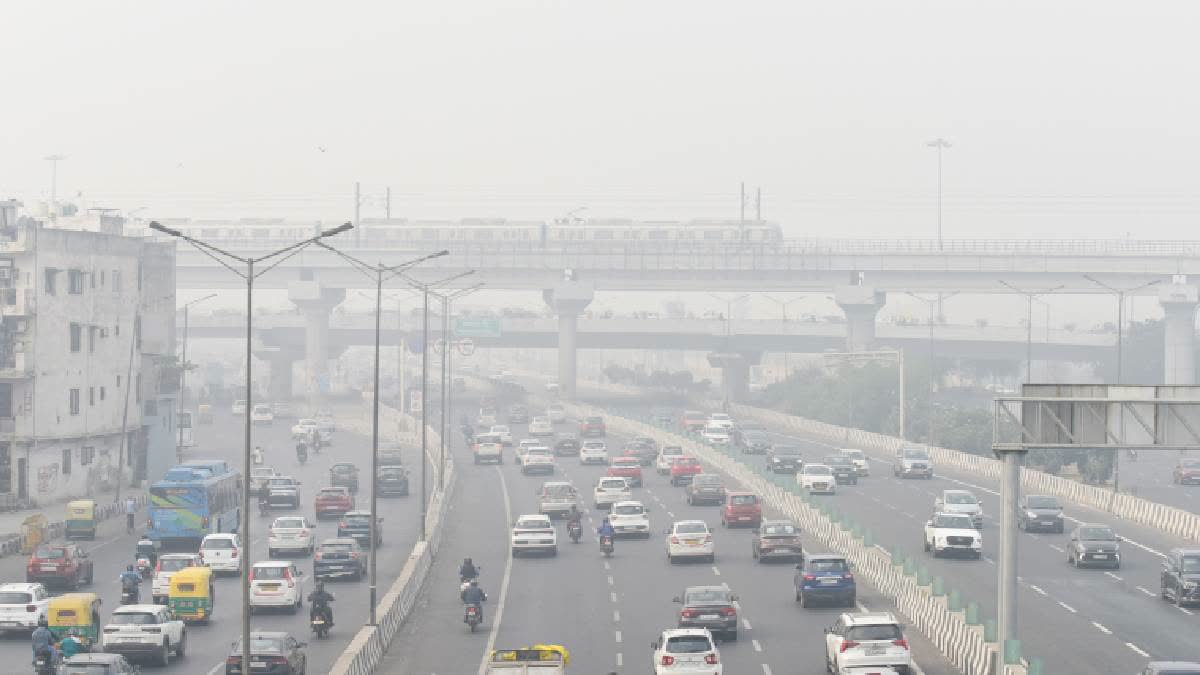New Delhi: The Commission for Air Quality Management (CAQM) has activated Stage 3 of the Graded Response Action Plan (GRAP) in the Delhi National Capital Region (NCR) as air quality worsens to a ‘severe’ level. From 8 a.m. today, the restrictions aim to curb escalating pollution levels, with measures focused on halting non-essential construction and limiting polluting vehicles.
Delhi’s air quality has remained in the ‘severe’ category for the third straight day, with a dense layer of smog trapping pollutants. A mix of seasonal pollution, traffic emissions, and stubble burning has compounded the crisis, pushing the authorities to enact stricter controls.
On January 14, Delhi recorded an AQI of 447, the highest this season. Heavy fog and smog blanketed the city, reducing visibility to zero at Palam airport and to 200 meters at Safdarjung, the city’s main weather station. The capital also recorded a seasonal low of 27.8°C during the day, with the minimum temperature staying at 17°C, three degrees above normal.
Key Restrictions Under GRAP-3
Construction and Demolition: To curb dust and emissions, GRAP-3 prohibits major construction activities, including earthwork, piling, trenching, and open-air operations of Ready-Mix Concrete (RMC) plants. Transport of construction materials like sand and cement is also restricted, with vehicles required to avoid unpaved routes.
Exemptions
Essential public services projects like railways, metro lines, healthcare facilities, airports, defense projects, and sanitation work may continue under strict dust and waste management protocols.
Vehicle Emission Norms: Under GRAP-3, vehicle restrictions are tightened in Delhi and NCR districts, including Gurugram, Ghaziabad, and Gautam Budh Nagar:
• BS-III Petrol & BS-IV Diesel Vehicles: These vehicles are restricted in Delhi and adjacent NCR districts.
• Diesel Medium Goods Vehicles (MGVs): BS-III diesel MGVs registered in Delhi are restricted unless they transport essential goods.
• Inter-State Diesel Buses and Light Commercial Vehicles (LCVs): Non-electric, non-CNG, non-BS-VI diesel inter-state buses and LCVs from NCR states are barred from entering Delhi unless carrying essential goods.
What GRAP Stage 3 Entails
GRAP is a set of escalating actions applied in Delhi NCR based on pollution severity:
• GRAP-1: Initiated when AQI is 201-300, implementing basic controls such as public advisories, dust suppression, and open burning restrictions.
• GRAP-2: Applied at AQI 301-400, adding measures like diesel generator restrictions, enhanced road cleaning, and water sprinkling.
• GRAP-3: Activated when AQI exceeds 400, banning non-essential construction, restricting certain vehicles, and halting brick kilns.
• GRAP-4: The most stringent level, triggered at AQI above 450, involves halting all construction, closing schools, and imposing odd-even schemes for private vehicles.
With Stage 3 now in force, the focus is on curbing emissions from construction and vehicle pollution sources to prevent air quality from slipping further.
Health and Safety Measures for Schools and Residents
With severe pollution persisting, the Delhi government has shifted all physical classes for students up to Class V online to minimize their exposure to toxic air.
Public Health Guidelines: Residents are advised to adopt practices that reduce pollution, such as using public transportation, walking, or cycling, avoiding coal and wood heating indoors, and consolidating errands to limit vehicle trips.
In a move to support public commuting needs and reduce private vehicle use, the Delhi Metro has added 20 extra trips on weekdays, totaling 60 additional trips.
Addressing a long-term health crisis
Delhi’s pollution crisis, aggravated by seasonal and human-made factors, highlights the need for coordinated efforts and stricter measures. The combination of low visibility, cold temperatures, and dense fog not only heightens pollution but also intensifies its health impact on vulnerable populations, including children, the elderly, and individuals with respiratory or cardiovascular conditions. Continuous exposure to ‘severe’ pollution levels can lead to serious health problems, emphasizing the urgency of GRAP measures to protect public health.
The CAQM’s Stage 3 response seeks to bring pollution levels under control, while residents are urged to contribute by reducing vehicle usage and following health safety measures. The authorities remain on alert for further deterioration, with GRAP-4 on standby should the AQI cross the 450 threshold.
Read more



